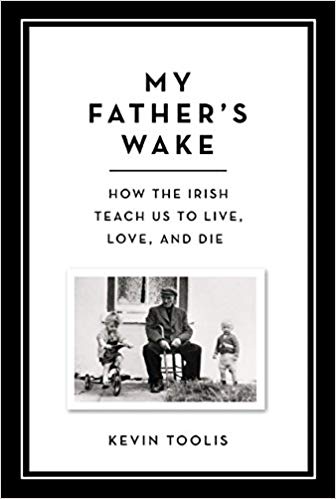
“As Sonny lay dying we had another kind of weather: Humid, hazy days, the entire village consumed in sea mist. We were unable to see further than the garden gate: all land, sea and sky shrouded in a still blanket that made night and day one. We were becalmed. Waiting for his heart to stop, the wake, his funeral, the church, the grave. Waiting for the death of this very ordinary man. Waiting, I thought, to start again. Resume Life. As it turned out, nothing else I have ever done or will do was more important than those precious days.”
This is what Kevin Toolis writes about being called home to an island off the west coast of Ireland, the place his father was born and was now dying. Toolis grew up in a city but spent his summers here in the village of Dookinella, where life and death are celebrated and endured almost by rote. People are connected, if not by birth then by proximity. They know you or your relatives. They know your history, as it is their own. They know what to do when one of them is literally on his death bed.
Toolis reenters the scene as neighbors and cousins mill around and women gather to begin the keening. His father is laid out in a small room that gets even smaller as people crowd in. Tea and ham sandwiches are served while Sonny’s breathing becomes more irregular. The dying man is never left alone. His departure from this life is witnessed. He is cared for until the end.
With superlative, poetic skill, Toolis describes the rural environment, hemmed all around by the relentless sea. He writes about the villagers who show up, no matter the weather, to pay their respects to Sonny Toolis and the family. He recounts incidents from his youth on the island and paints a picture of his own belonging, juxtaposed with the strong separation he feels from having moved on. Still, everyone seems to know him and offers their condolences matter-of-factly. “Sorry for your troubles” is repeated by one and all.
My Father’s Wake delivers on its promise in the subtitle: How the Irish Teach Us to Live, Love, and Die. We learn how plain ritual and nostalgic tradition work together to allow the death of a man to cause community, relationship. Even Toolis, who had not partaken of the process often in his adult life, was struck by the effects of having neighbors come in and tend to the matter at hand. He reports that villagers assumed the responsibility of carrying Sonny’s coffin to the cemetery up the hill where others had dug the grave. They consider it an honorable duty.
Toolis writes: “In our Whisper Death World we have lost any commitment to the bodies of our dead. In the West, we unquestioningly accept the state’s removal and butchering of our dead as a high mark of our civilization… Death is a job for the Public Health Authorities and a caste of medical professionals, mortuary attendants, undertakers to legislate and regulate, fill in the forms, and clear up the mess. And by some unexplained necessity protect us all, the living and the dead, from something. There must surely be a good reason for this?”
Our culture has, by the drift of modern necessity, moved us away from the practical realities of death. We don’t live among people who know us; most folks certainly don’t have time to sit in a room awaiting another one’s passing. We don’t talk about the dreaded subject. We don’t engage in these ways.
And we are unlikely to suddenly take on the Irish tradition (that no doubt was practiced by our ancestors in the not-too-distant past) just because one man brings to our attention how humanizing it was for him to experience it. But we can take valuable cues from reading his account. We can begin to look our mortality in the eye and talk among ourselves. Toolis gives us that.
Ann Hutton